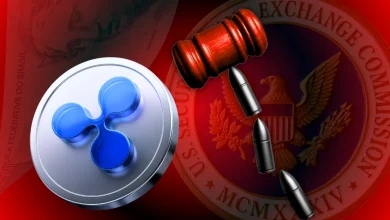
Ripple CLO Stuart Alderoty calls the new bipartisan Clarity Act a major step toward clear U.S. crypto regulation.
The bill outlines SEC-CFTC oversight, a national licensing framework, and AI transparency mandates.
Alongside the GENIUS and STABLE Acts, it signals growing momentum for comprehensive U.S. crypto laws.
The Digital Asset Market Clarity Act of 2025 is making serious waves across the crypto world. Ripple’s Chief Legal Officer, Stuart Alderoty, recently called it a “big step forward” in a post on X. It reflects a growing belief that the U.S. may finally be moving toward meaningful regulation for digital assets.
This bipartisan bill could give the American crypto industry the structure it needs to thrive, while putting the U.S. back in the race for global leadership in digital finance.
What Is the Clarity Act All About?
The Digital Asset Market Clarity Act aims to solve one of the biggest problems in the U.S. crypto market – regulatory confusion. Introduced by Chairman French Hill and supported by both Republican and Democratic lawmakers, the bill outlines a clear split of responsibilities between the SEC and the CFTC.
It also proposes a national licensing framework that would make it easier for crypto businesses to comply with regulations. This could create healthy competition, attract more innovation, and include tailored rules for stablecoins to fit their unique financial role.
The goal is to reduce uncertainty for crypto companies and investors and bring more clarity to how digital assets are governed.
AI Transparency Takes Center Stage
The bill doesn’t stop at crypto. It also introduces new rules around artificial intelligence. Specifically, it requires federal agencies to publicly disclose how they’re using AI in their regulatory processes. This includes information about what the AI does, its limitations, and how much it costs.
According to Representative Bryan Steil, this type of transparency is essential to building trust to the “golden age” we are in now.
Ripple’s Alderoty Backs the Move
Stuart Alderoty has been a long-time advocate for smart crypto laws, and the Clarity Act lines up with his vision. In his post, he praised the lawmakers who have pushed the bill forward, including French Hill, GT Thompson, Angie Craig, Dusty Johnson, Don Davis, Bryan Steil, and Ritchie Torres.
Alderoty believes this bill could bring the U.S. closer to the level of regulatory clarity already seen in other countries. He also sees it as a step toward encouraging more institutional investment and helping crypto businesses operate with greater confidence.
More Crypto Laws in the Pipeline: GENIUS and STABLE Acts
The GENIUS Act, passed by a 66-32 Senate vote on May 20, 2025, mandates 1:1 reserve backing allowing banks and non-banks to issue them under tiered management. Concerned by Senator Warren about weak protections, it awaits a June vote.
Additionally, given consumer safety, the STABLE Act, which was presented by Representatives Hill and Steil, prohibits FDIC claims and suspends algorithmic stablecoins for two years.
A Defining Moment for U.S. Crypto?
With major crypto players like Ripple backing it and bipartisan support in Congress, the Clarity Act could be a turning point for crypto regulation in the United States.
By encouraging innovation, protecting consumers, and creating a clearer legal framework, this legislation has the potential to finally unlock the U.S. crypto market’s full potential.
The world is watching closely. If passed, this bill could help the U.S. move from playing catch-up to leading the global digital asset revolution.
Never Miss a Beat in the Crypto World!
Stay ahead with breaking news, expert analysis, and real-time updates on the latest trends in Bitcoin, altcoins, DeFi, NFTs, and more.
FAQs
Many believe clear regulation like the Clarity Act will attract innovation and investment, helping the U.S. compete with regions like the EU (MiCA).
Clearer rules are expected to increase institutional participation by reducing compliance risks and providing a more predictable investment environment.
The Clarity Act aligns with global trends of increased oversight (like MiCA in the EU), focusing on consumer protection and market integrity to legitimize crypto.








